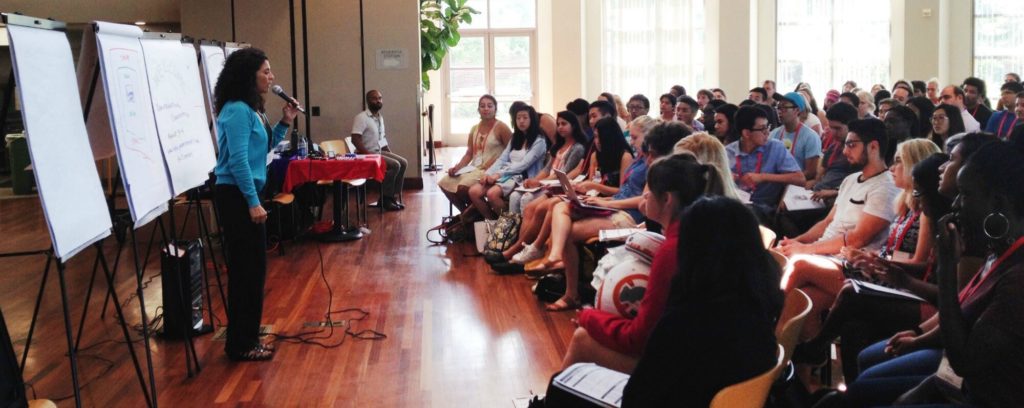In the dark of early morning, I threw a notebook, a pen, and a thermos of tea in my bag and rushed out the door into the windy darkness to catch the 6:40 bus downtown. I was headed for an all-day equity training by the Luna Jimenez Institute for Social Transformation (LJIST) at the Prosper Portland building.
Nanci Luna Jimenez is the founder of LJIST, and was the lead trainer of the workshop. Throughout the day, we got lots of opportunities to consider the intersectional topics of oppression (including adultism, classism, racism, sexism, heterosexism, anti-Semitism, ableism, and ageism), that we are all steeped in. Nanci and Kathleen, the two trainers, masterfully and vulnerably shared their stories of how they came to do this work, and guided us through discussions, activities, and role plays confronting oppression. We talked about the topics that we were most passionate about as allies for each other–like immigration, black lives matter, and homelessness. We shared and heard stories of the other workshop participants both as allies and as targets, at the varying intersectional levels of our lives. One phrase that stuck with me is that oppression is like pollution–it’s all around us, and we are all breathing it in, even when we don’t necessarily notice it. No wonder we carry patterns of oppression within us. No wonder we need trainings like these to unearth the early and consistent messaging we have all taken in throughout our lives.
With some recently acquired funding from the Meyer Memorial Trust, the Colins Foundation, East Multnomah Soil and Water Conservation District, and a generous anonymous donor, everyone on our staff has been able to access trainings that help us advance our capacity to serve more communities in the watershed. I was attracted by the name of this particular training, titled “Effectively Interrupting Inappropriate and Offensive Comments in Ways that Heal and Transform” because I was tired of not knowing what to say, thinking of a response too late, or responding angrily and losing my cool. I was hoping to learn new ways to identify and articulate racism and other forms of oppression, and call it out when I see it. Boy was my expectation for the day wrong! The theory behind the LJIST approach is not one of whistleblowing and response; instead, it is a theory built around compassion and listening. And we worked to build that framework of compassion by looking first within ourselves.
Both through work and in my personal life I’ve been digging into my own self-education revolving around equity-starting by examining my own whiteness, and my personal role in dismantling white supremacy. I know that organizations are made up of people, and the better I can understand the underlying histories and patterns of racism, the better I can do as one human in my role at the Council to uphold anti-racist institutional patterns. According to 2010 Census data, watershed residents self-identified as Hispanic (13%), Asian (8%), African American (4%), and Native American (1%). That all adds up to 26% BIPOC (Black, Indigenous, and People Of Color) who live in our watershed. Although we do have some representation across groups in the organization and in our volunteer base, we are still a long way from reflecting the watershed’s diversity. We acknowledge the systemic oppression of racial groups, and know that we play a role in healing that legacy of inequity. As an organization that serves the public, with the mission to restore the creek with the support of the community, we take our role in engaging all of the groups in our jurisdiction very seriously. We know that a diverse community is a strong community.
This training was not my first and definitely not my last, but it was a very unique and transformational experience. I was so delighted to participate and couldn’t recommend the Luna Jimenez Institute any more highly. At the end of the day, I felt that I had been cracked open and was able to see the events and patterns that have shaped my thinking about my own liberation, and the liberation of others. I walked away with a lot of deeper questions that I am still working through a week later-and doubt I will ever truly finish.
Because we work with thousands of people who care about Johnson Creek every year, we have an incredible opportunity to help build community around the restoration of this unique urban slice of nature. We are so lucky to be on the front lines of some truly revolutionary equity work, and it all starts with education.
If you’re interested in learning more about the Luna Jimenez Institute for Social Transformation, please check out their upcoming events in Portland at the links below:

